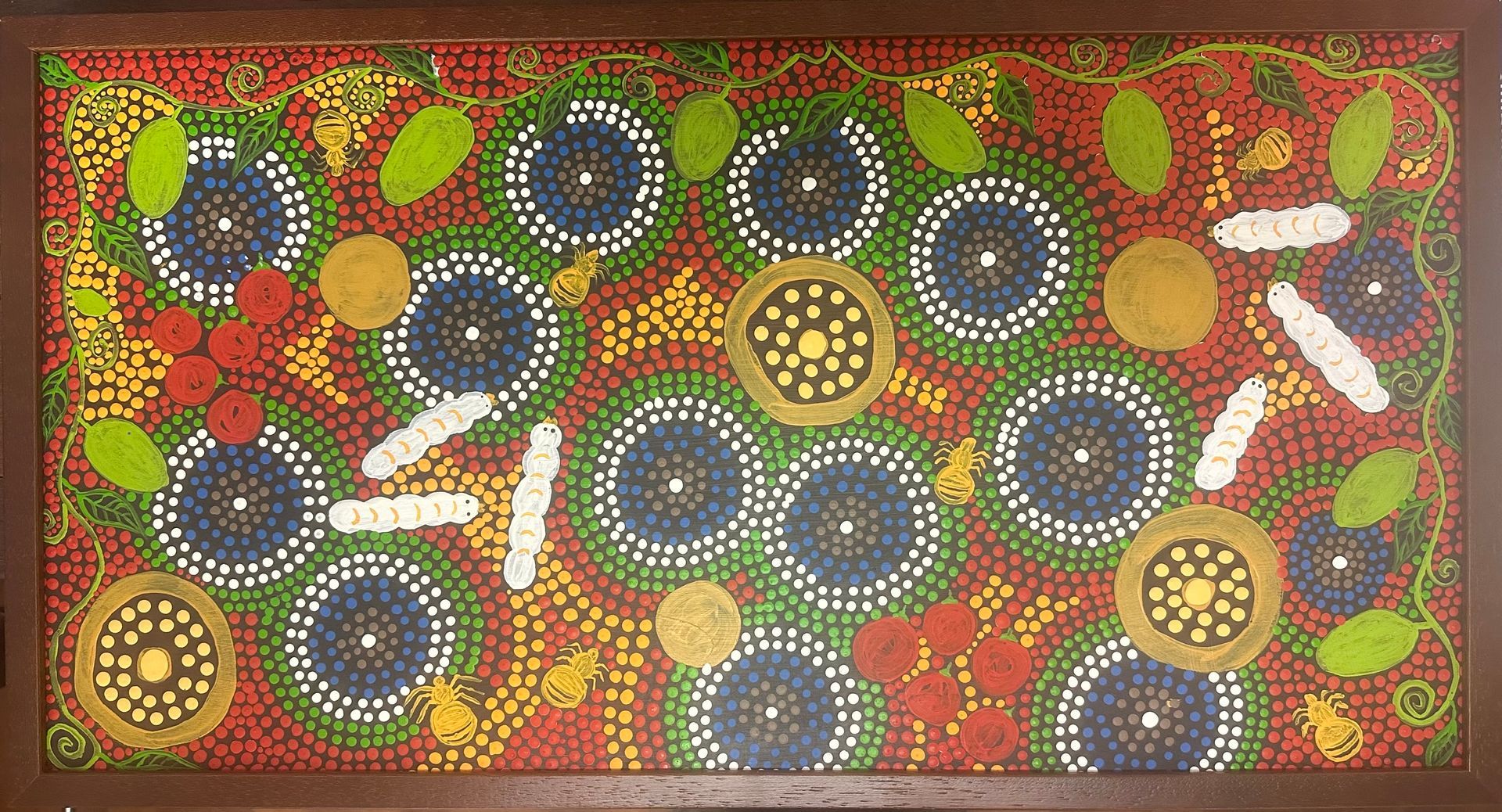Mullygrubbing

Painting from an anonymous Noongar tribe member featuring friendly-looking witchetty grubs, also known as mullygrubs, which will soon grace the wall at pa harakeke
We were discussing iconic times in the Ozzie-Kiwi relationship over dehy meals in a hut on the Munda Biddi. “Remember that cricket game where … ?”
“You mean the mullygrub?” Tom said.
“Mullygrub?”
“Yeah, when Chappell bowled underarm,” Tom replied.
Of course we knew about the underarm bowl, but we’d never heard the term mullygrub before. Australia has a culture all its own, including characterful birds, a rainbow of spring wildflowers, effusively friendly people, and colourful pieces of jargon.
For anyone reading this who does not remember the underarm bowl, you are probably excused if you were born after 1975 but, if you emigrated to New Zealand, it should have been part of your induction process. I was amused to discover that, of the five people online in my memoir writing class (including the teacher), only three knew about the underarm bowl and one of those indirectly because her partner is a cricket fanatic. The other two immigrants had never heard about it. Quelle horreur! It’s like not knowing where you were when Princess Diana died.
For the record, on 1 February 1981, there was one remaining bowl to ball in a match between New Zealand and Australia. It was the third match in a best of five series for the 1980-1981 World Series Cup and Australia and New Zealand had won one game each so far. In this third game, New Zealand were six runs behind Australia. With one ball remaining they couldn’t win, but if the batsman scored a six the match would be tied. For real cricket ignorami, to score a six in cricket you have to hit the ball cleanly over the boundary – a big hit.
Greg Chappell, the Australian captain, instructed his brother Trevor to bowl the ball underarm. Cricket bowling is normally at speed overarm. There is no way that a ball bowled along the ground at low speed can be hit hard enough and upwards to fly over the boundary at least fifty-nine metres away. Therefore the batsman simply stopped the ball hitting the wickets and New Zealand lost the game. The underarm bowl was legal, but deemed totally against the spirit of cricket. The resultant outrage led to a change in the rules of cricket in Australia and New Zealand, as well as to a long-held grudge between the two countries.
However, back to the word ‘mullygrub’. What a great word. The first spelling of the word, at the end of the sixteenth century, was ‘mulliegrums’. This may have been another form of the word ‘megrims’ which means a headache. ‘Megrims’ itself came from an English contortion of the French ‘migraine’. 'Mulligrums', which morphed into 'mulligrubs' came to also mean suffering from low spirits and a stomach-ache.
The word was used most entertainingly in 1898 in Brann the Iconoclast by William Cowper Brann:
“It is easy enough to say that a pessimist is a person afflicated with an incurable case of mulligrubs – one whom nothing in all earth or Heaven or Hades pleases… one who usually deserves nothing, yet grumbles if he gets it.”
'Mulligrub' changed its spelling to 'mullygrub', but then, unfortunately, largely fell out of usage except in Australia where it evolved to refer to witchetty grubs. 'Mullygrub' also came to mean a bowled ball that just rolls along the ground rather than bouncing. The word may have been seen as applicable to cricket because ‘mully’ used to mean ‘dusty’ and to ‘grub’ is to scrape at the ground.
While there are many things Australian we don’t want in New Zealand, such as possums (faint hope of getting rid of them), flies (at least we don’t have as many), snakes, poisonous spiders, lots of great white sharks, stinging jellyfish, I’ll happily take ‘mullygrub’ – feel free to propagate the word widely!






